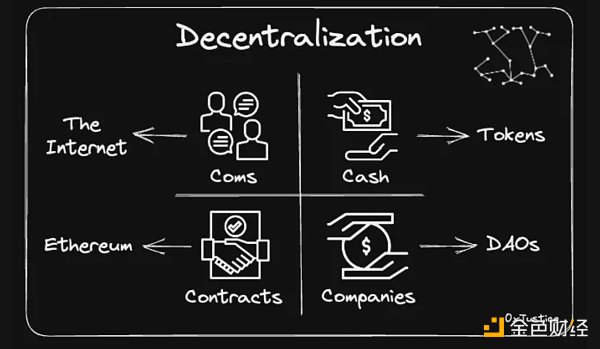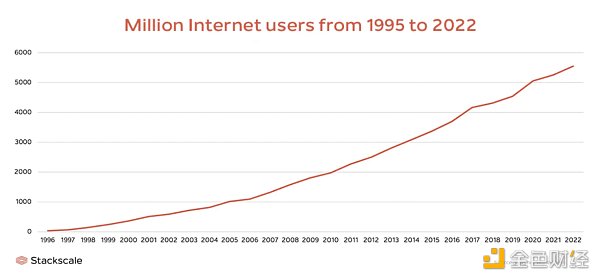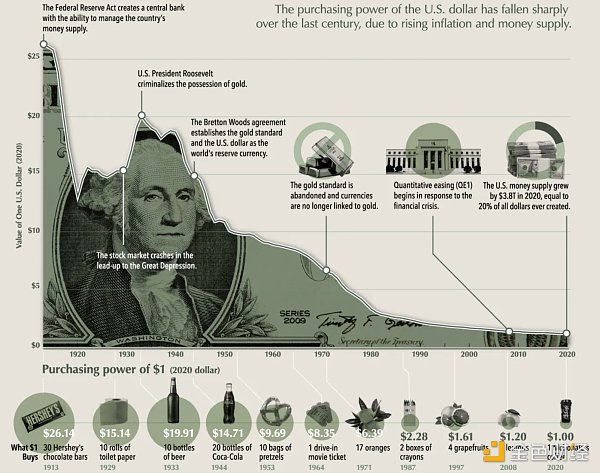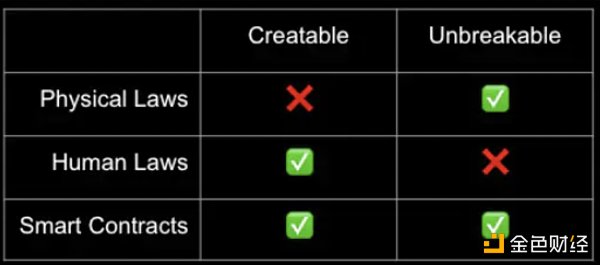Decentralization is to prevent valuable systems from being exploited, and decentralization itself is not the goal. You can smash a mirror to “scatter” it, but it doesn’t make it more valuable.
Throughout most of human history, the state has served as the ultimate intermediary and has had no competition. Books like “Sovereign Individual” predicted that the invention of microprocessors and the internet would fundamentally change this situation.
The author of the book believes that we cannot imagine a world free from state rule, just as the people of the Middle Ages could not imagine a world free from the rule of the Roman Catholic Church. Although they failed to predict the complete collapse of the church as an institution, they predicted the end of the state as an intermediary in human activities.
“Governments ultimately have no choice but to treat the people in their service areas more like customers, rather than treating them like organized criminals treat extortion victims.”
– Sovereign Individual
One way to facilitate this transformation is to identify key areas for disintermediation. This article will explore four such areas and draw conclusions based on speculation about what might happen in the future. The four key areas of disintermediation are: communication, currency, contracts, and companies.

Decentralized Communication
The first major transformative event in this legendary story took place on the Internet. On January 1, 1983, ARPANET officially switched to the TCP/IP standard, and the Internet was born. This event was the first major disintermediation event, as it immediately democratized all data and information sharing.
Anyone could create a website, anyone could talk to people in other parts of the world. By the 1990s, everyone was speculating on the impact of globalization. Wikipedia replaced the Encyclopedia Britannica, and the era dominated by three news channels and one newspaper was replaced by thousands of news sources and countless citizen journalists.

https://www.stackscale.com/blog/internet-evolution-statistics/
The Nazi Germany and Soviet Union-induced famine in Ukraine relied on the state’s perception and control of various forms of communication and news media. The Internet has decentralized the power of “narrative,” and the state must compete with other sources to determine what is relevant and legitimate.
Decentralized Currency
Milton Friedman predicted this, and cypherpunk Satoshi Nakamoto achieved it: digital cash. Prior to this, almost all globalized currencies were in the control of nations, and no nation could resist the temptation of a printing press, which is a perfect trap.
Unlike the private sector, mismanagement and misappropriation do not lead to the bankruptcy of a nation. When politicians can bribe voters with unlimited currency, not even a democratic country can escape. In my lifetime, the US dollar has depreciated nearly four times, and in the past three years, the government has printed 80% of the circulating US dollars. This trend is shocking and unsustainable, to the point that celebrities like Balaji have bet $1 million on the collapse of the US dollar in June of this year.

Bitcoin changed all that. It demonstrated a new way to create currency, one that could be tamper-proof and not grant privileges to any one participant. By making everyone a bookkeeper, it could prevent any party from manipulating the system. Bitcoin, and the many technologies that followed in decentralized currency, separate money from the state.
Superpowers in the world are being affected as it disrupts the old world order. BlackRock CEO Larry Fink reiterated this post-nationalist reality, stating in a statement, “Bitcoin is an international asset that is not based on any one currency, it is an asset that people can use as an alternative.”
Decentralized Contracts
While digital cash is important, the world runs on contracts. The earliest contracts were called covenants or treaties, solemn oaths. Participants would make solemn promises to do something and if they didn’t, they would be cursed by the gods.
Long after that, when civil institutions like governments and courts arose to enforce and arbitrate such agreements, legal contracts were born. For most of human history, contracts have been the primary means of coordination.
When Nick Szabo introduced the idea of smart contracts, this history took on new meaning. Smart contracts are a set of promises encoded in a blockchain platform that execute if predefined conditions are met. This ability means that it can distribute funds to the appropriate parties automatically after a settlement rather than going through the courts for claims. We can even encode human arbitration as a fallback into the smart contract.

1/8
— 0xJustice.eth 💜 (e/acc) (@singularityhack) April 26, 2023
In my other writings, I refer to this as the Third Natural Law, and I don’t think that’s an exaggeration. The decentralization of contracts is a massive leap forward in human coordination. We cannot overstate the access, speed, and efficiency that this technology brings. Smart contracts are disrupting the entire regulatory and legal space. Since the launch of Ethereum, over 720 million smart contracts have been deployed, a 300% increase from 2022.
Decentralized Companies
Humans can achieve more when they work together. Even creating something as simple as a pencil requires thousands of specialized participants to create everything from erasers, graphite, to wood, and assemble and distribute them on a large scale.
The basic idea is that if you align people under a single task and incentive structure to reduce transaction costs, you can build more complex things at a lower cost. This idea is known as the theory of the firm, where stakeholders of such organization are connected through contracts and claims to future value (shares).
The Dutch East India Company in the 17th century was the first prominent example of this joint-stock organization. The important thing is that the state is the only authority that enforces an individual’s claim to shared assets. The company only exists when registered and recognized by the government. The same goes for company stocks. As long as the intermediary says it exists, it exists. All of this changed with the emergence of DAO.
For the first time in history, a group can have common ownership of assets or enterprises without intermediaries. The attribute of shared ownership is the fundamental characteristic of DAO. Using smart contracts, you can pool funds with others to purchase assets, jointly control the assets, and share the appreciation. This model is independent of any government and is purely based on unstoppable code.
Conclusion
This legendary story has a natural progression, where each layer is a prerequisite for the next. Once we open the lines of communication, we need a way to send value (currency); thus, commerce is born. On this basis, we create more complex agreements based on future commitments (contracts) and common interests (DAO).
Whitfield Diffie has a famous quote: “The advance of civilization is achieved by increasing the number of important operations that we can perform without thinking.” This is the role of every advancement. It eliminates potential complexity, creates guarantees for the future, and enables possibilities for automation. So where does all this lead to?
Computer scientist and science fiction legend Vernor Vinge is one of the earliest popularizers of the concepts of singularity and cyberspace. His work “Rainbows End” envisions a world where self-executing digital contracts become widespread and available to everyone.
As the book describes, these “subsidiary relationships” are smart contracts that are used as freely as we use language. They are temporary alliances formed for specific purposes, with a duration that may be only a few minutes and are created and terminated in an ad hoc manner. They are used in various aspects, and roles are performed by special teams formed for specific purposes, without the need for government or company intervention.
This fictional story is becoming a reality. Simon de la Rouviere, one of the main contributors to the ERC20 standard, has been advocating the advantages of tokenization since 2013. Through tokenization mechanisms, we can coordinate in the way Vinge imagined with code.
“Do you think it makes sense to collectively own a song in a token? To tokenize attention? To tokenize contracts directly? To tokenize memes? To tokenize people? To tokenize this blog post? To tokenize public goods? What is the granularity of blockchain tokens? What is the minimum bandwidth coordination system allowed by blockchain tokens? 10-second organizations? Creative derivatives? Meme derivatives?”
– History Is Rhyming: Fitness Functions & Coordinating Blockchain Tokens To The Web
These are new, unimaginable realities faced by decentralized, autonomous communities. The Leviathan-like states will not willingly or quietly disappear. They expect every possible mitigating technology, from global psychological warfare campaigns to the elimination of citizens’ freedoms.
This is a battle worth fighting, and it is what cypherpunks have been waiting for. Our consolation is that our weapons are not physical, but electronic, encrypted, and meme-based. We are witnessing the final throes of the Leviathan.
Like what you're reading? Subscribe to our top stories.
We will continue to update Gambling Chain; if you have any questions or suggestions, please contact us!